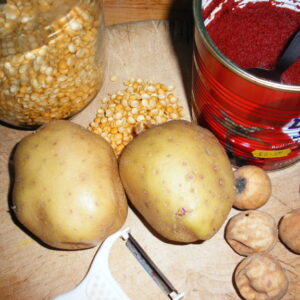
The recipe for this very popular, classic Iranian dish has somehow escaped all of our newsletters and books. Until now.
We had it for dinner last night at Persepolis Towers – jah-ye-shoma khali boud* It was so nice that we ate it all before we thought that we should perhaps take a photo and write it up, so you’ll have to make do with this rather rubbish still life of ingredients.
‘Gheimeh’ just means ‘little pieces of meat’ – this is traditionally lamb in Iran, although it is easy to make a (diced, boneless) chicken or veggie (using aubergine and courgette) version.
The split peas are not the mushy English variety that we use to make pease pudding, but rather chana dal – halved, dried chick peas. You could improvise with lentils if you don’t have a branch of Persepolis on your corner**. Or you could buy them here… The only other hard-to-source ingredient in dried limes, which handily you can buy here – or you could improvise by using a couple of small fresh limes.
Ingredients (for 8-10):
300g lapeh (split peas, see above)
1 small leg of lamb, boned and trimmed of fat
2 medium onions, chopped
1 heaped teaspoon ground turmeric
1 scant teaspoon ground black pepper
8 dried limes, rinsed and pricked
2 level tablespoons good tomato paste
1-2 teaspoons salt
700g spuds (suitable for chipping – Maris Piper or King Edwards lead the potato pack here), peeled and cut into thinnish fries
oil for frying
Sublimely simple one pot cooking, this. Soak the split peas in cold water for half an hour or so.
In the meantime, cut the lamb into 2cm (ish) cubes, and place it in a saucepan together with the onions, spices and dried limes, and add enough water to cover it by around 5cm. Bring to the boil and then set to simmer for around half an hour before adding the drained lapeh and the tomato paste. Cook gently for another hour before adding enough salt to taste.
Fry the ‘chips’ in hot oil until that moment just before they start to colour, and drain on kitchen paper before adding to the casserole (although if you are ‘entertaining’, like, rather than just feeding faces you may prefer to spoon the potaotes on to the top of the dish as you serve). Bubble for a few minutes more and then serve over white rice. Trad accompaniments are raw onion and garlic, and thick plain yoghurt.
*a lovely Persian expression meaning literally ‘your place was empty’ – in other words, ‘you were missed, you should have been there…’
**Oh – sorry – we forgot: THERE IS ONLY ONE PERSEPOLIS.

